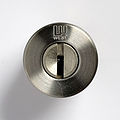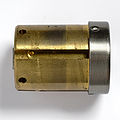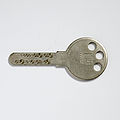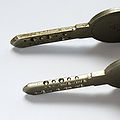WEST 917: Difference between revisions
From Lockwiki
Jump to navigationJump to search
m (→{{PAGENAME}}: Capitalize WEST throughout) |
m (→Principles of operation: fix pin info) |
||
| Line 33: | Line 33: | ||
== Principles of operation == | == Principles of operation == | ||
The [[WEST]] '''917''' contains 20 pins, arranged in rows of | The [[WEST]] '''917''' contains 20 pins, arranged in rows of seven on the left and the top of the keyway as well as six on the right. It also contains a core-centering ball bearing. | ||
The pin chambers | The pin chambers on the sides of the core have counter milling as an additional defense against lock picking. The 917 contains multiple [[security pin]]s: both regular and mushroom driver pins as well as spooled and tapered multiple spooled key pins. The key is bitted on the sides and edges of the blade and is reversible. | ||
== Gallery == | == Gallery == | ||
Revision as of 16:42, 11 November 2022
WEST 917
| WEST 917 | |
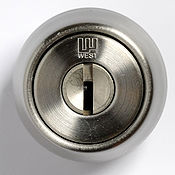 | |
| Name | WEST 917 |
|---|---|
| Manufacturer | WEST |
| Lock Type | Cylinder |
| Lock Design | Pin-tumbler, Dimple |
| Related Locks | |
| WEST 916 | |
The 917 is a dimple lock made by the Japanese company WEST.
Principles of operation
The WEST 917 contains 20 pins, arranged in rows of seven on the left and the top of the keyway as well as six on the right. It also contains a core-centering ball bearing.
The pin chambers on the sides of the core have counter milling as an additional defense against lock picking. The 917 contains multiple security pins: both regular and mushroom driver pins as well as spooled and tapered multiple spooled key pins. The key is bitted on the sides and edges of the blade and is reversible.
Gallery
See also
| This article is a stub. You can help Lockwiki by expanding it. |
